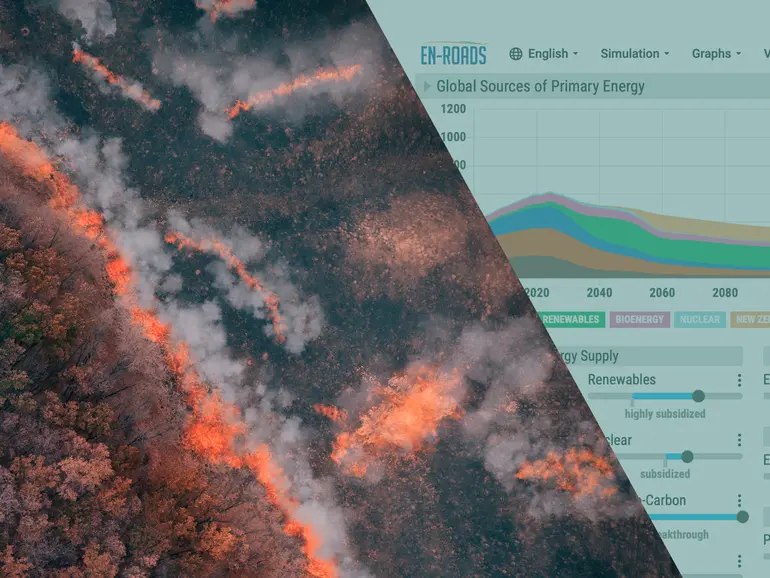For business leaders: A digital tool for visualizing climate actions
A free, updated simulator allows users to visualize environmental impacts and better guide climate decision-making in their organizations.

Faculty
Bethany Patten is the inaugural Executive Director of the Massachusetts Institute of Technology’s Climate Policy Center–MIT’s “front door” to provide evidence-based climate research for local, state, national, and international policymakers.
Previous to this, she served as the Director of Policy and Engagement for the MIT Sloan Sustainability Initiative where she cofounded MIT Climate Pathways Project bringing together faculty, staff, and researchers to advance the adoption of evidence-based climate policy through top tier decision-makers. The project, which leverages the En-ROADS Climate Solutions Simulator codeveloped by Climate Interactive and MIT Sloan, has engaged over 12,000 global leaders in government, business, and civil society.
In addition to leading MIT’s Climate Policy Center, Bethany is a Senior Lecturer at the MIT Sloan School of Management. Her work centers on the translation of academic research into real-world impact in the public and private sector. Specifically, she examines how institutions can best practice ethical political engagement, connecting with and educating leaders ranging from MIT graduate students to members of the United States Congress.
As an MIT Sloan faculty member, she teaches the action-learning based course Sustainable Business Lab (‘S-Lab’) and several MIT Sloan Executive Education courses. Elsewhere at MIT, she is a member of the MIT Climate Policy Working Group and sits on MIT Sloan School of Management’s Faculty DEI Committee.
Bethany is recognized as a national sustainability leader and serves as a board member and treasurer for the Environmental League of Massachusetts and board member of the Climate Beacon Project. She is committed to her community and actively serves on the executive committee and was a past president of Boston’s Bay Village Neighborhood Association.
Prior to MIT, Bethany worked for more than a decade in business and financial operations in the book publishing industry. She holds an MBA from the MIT Sloan School of Management, a MPA at the John F. Kennedy School of Government at Harvard University, and a BA from Boston College.
Featured Publication
"Is It Easy Being Green?: MIT Sloan Considers the Opportunities and Threats of Sustainable Building."John D. Sterman, Ankita Kaulberg and Bethany Patten. In Case Study: MIT Sloan School Management Learning Edge, Cambridge, MA: 2020.
Featured Publication
"Climate-Related Financial Disclosures: The Use of Scenarios."Erik Landry, Louis Carranza, James R. Gomes, Henry Jacoby, Donald Lessard, Sergey Paltsev, and Bethany Patten. Cambridge, MA: November 2019.
John D. Sterman, Ankita Kaulberg and Bethany Patten. In Case Study: MIT Sloan School Management Learning Edge, Cambridge, MA: 2020.
As the newly minted senior director of recycling and sustainability at Staples Stores, Mike Sauchuk’s first challenge was to develop a strategy that moved the company’s green initiatives forward and also aligned with its business objectives. After learning about the Sustainability Initiative at MIT Sloan from one of the many MIT alumni who work at Staples, Sauchuk was eager to see how a team of Sustainable Business Lab (S-Lab) students might be able to help him in his new Recycling Services program.

A free, updated simulator allows users to visualize environmental impacts and better guide climate decision-making in their organizations.
Multiple MIT Sloan projects were recognized in this year's Financial Times' Responsible Business Education awards.
Bethany Patten thinks many businesses that take steps with eco-friendliness in mind might want to share their story.
MIT has offered a certificate programme in sustainability since 2011, and the number of students has mushroomed each year.
Demand for workers who understand E.S.G. will likely continue to grow, said Bethany Patten ...